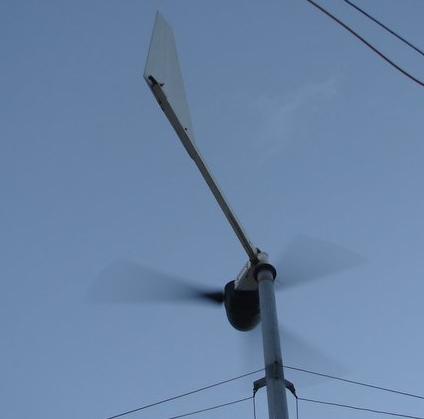| Author |
Message |
newbie-from-pa
Newbie

Joined: 20/06/2008
Location: United StatesPosts: 8 |
| Posted: 02:57pm 28 Jun 2008 |
 Copy link to clipboard Copy link to clipboard |
 Print this post |
|
I would like to know how to wind coils and build stators in different voltages, example 24 volts or 48 volts.
I have already built 12 volt stators/windmills, but would like to try 24, 36, 48 volt mills.
Is there anything gained by using 24 or 48 voltage mills?
Thanks. |
| |
oztules

Guru

Joined: 26/07/2007
Location: AustraliaPosts: 1686 |
| Posted: 11:34pm 28 Jun 2008 |
 Copy link to clipboard Copy link to clipboard |
 Print this post |
|
It will depend on your situation as to what voltage is "best" for you.
If you have invested heavily in 12volt equiptment, then this will slant the decision to 12v.
That said, 12v is wasteful of power in the alternator coils, in the rectification process and in the transmission from tower to battery bank. If you use 12v direct, then from the batteries to where ever you are using it. Watts = volts X amps. So to drive a 120w load at 12v means we have to get 12v@10amps to the load. That 10 amps must be transported over your wiring loom, and so needs to be reasonably heavy cable to stop the power loss in the wire.
As soon as you go any distance with this voltage it is easy to burn up 10% or more of your available power and end up a volt or 2 shy of your nominal 12v.
With higher voltages, these losses become very much less for the same loom and load.
At 48v, our 120watt load is now only about two and a half amps, our losses over the same loom will be small. So transmission of the power around the place via reasonable size conductors is the benefit.
Drawbacks include higher priced converters, and much less direct driven gear to use..
Diode loss is also very high in a 12v system. if you lose a volt across the diode at 48v, it is no biggie, but at 12v, you lose near 10% just for this process.
So the higher the voltage, the better for losses. The kicker is that the battery bank becomes a killing machine over the 50 odd volt mark, and presents a very real possibility of shortening your life span if you are not meticulous in your care and handling of the lethal voltage/current combinations above these levels.
For a small system, 12v is fine. For anything more serious, a higher voltage would be prudent.
........oztules
Village idiot...or... just another hack out of his depth |
| |
GWatPE

Senior Member

Joined: 01/09/2006
Location: AustraliaPosts: 2127 |
| Posted: 01:22am 29 Jun 2008 |
 Copy link to clipboard Copy link to clipboard |
 Print this post |
|
My experience has shown that 12V is OK for low loads up to 300W. Above this power level and up to 1000W, then 24V systems, are suitable. Above 1000W, then a 48V system is the go. If you use more than 2kW, then RE solutions become less cost effective and distribution becomes a problem, as well as the energy storage problem. A high voltage battery bank, does require special precautions, for servicing, etc. It is probably better to generate and store the power where it is needed, or change lifestyle to reduce the RE power need. .. .. Gordon.
become more energy aware |
| |
hoodlem

Newbie

Joined: 02/07/2008
Location: AustraliaPosts: 7 |
| Posted: 11:55am 07 Jul 2008 |
 Copy link to clipboard Copy link to clipboard |
 Print this post |
|
oztules and GWatPE are spot on about high voltage DC, it
has more potential to kill than good old 240
Once DC has got a hold of you it won't let go, there is just not enough awareness about the real dangers of High
Voltage DC
I remember when I used to install car stereo and we had a heap of those 12 battery's for remote controls, so as you do we made a small pile of 84 volts, I watched as our super tech touched each end of the terminals and was promptly
thrown into the shelving behind him, there was no way I was going to have a go
free information for all |
| |

